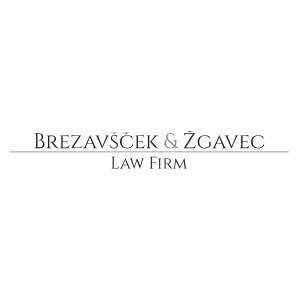Best Real Estate Lawyers in Slovenia
Share your needs with us, get contacted by law firms.
Free. Takes 2 min.
Free Guide to Hiring a Real Estate Lawyer
Or refine your search by selecting a city:
List of the best lawyers in Slovenia
About Real Estate Law in Slovenia
Real estate law in Slovenia is a well-regulated field governed by various national statutes and directives. This legal area encompasses all matters concerning property ownership, real estate transactions, tenancy agreements, and land use regulations. Slovenia boasts a robust property market, attracting both local and international investors. The country's real estate sector is supported by a transparent land registry system, which ensures clear title to property and accurate recording of property rights. Understanding the legal framework governing real estate in Slovenia is crucial for anyone planning to buy, sell, or invest in property.
Why You May Need a Lawyer
There are several scenarios where engaging a legal expert in real estate might be necessary:
- Buying or Selling Property: Legal advice can help ensure that transactions are completed smoothly, with due diligence performed to confirm the property's legal status.
- Lease Agreements: Whether you are a landlord or a tenant, a lawyer can help draft or review contracts to safeguard your rights and interests.
- Disputes Resolution: Legal intervention may be required to resolve disputes related to ownership, boundaries, or tenancy issues.
- Property Development: Navigating the regulatory environment for development projects often requires assistance from knowledgeable legal professionals.
- Inheritance: Understanding the inheritance laws related to real estate can be complex, especially if international elements are involved.
Local Laws Overview
Several key aspects of Slovenian real estate law are particularly relevant:
- Land Register: All real estate transactions must be recorded in the Land Register to secure property rights.
- Constitutional Protection: Property rights in Slovenia are constitutionally protected, providing security and transparency in real estate dealings.
- Zoning and Planning Regulations: Local municipalities govern the land use, establishing the types of structures that can be built and their uses.
- Foreign Ownership: While EU citizens have similar property rights as Slovenians, non-EU citizens may face certain restrictions and should consult with a lawyer.
Frequently Asked Questions
What documents are required for buying property in Slovenia?
Typically, you will need a property sales contract, proof of identity, a tax number, and registration in the Land Register. Engaging a lawyer can help ensure all necessary documentation is correctly prepared and filed.
Can foreigners buy real estate in Slovenia?
Yes, EU citizens can buy property under the same conditions as Slovenians. Non-EU citizens may have restrictions and should seek legal advice on how to proceed.
How are property taxes handled in Slovenia?
Property transactions are subject to a real estate transfer tax. Additionally, there are annual real estate taxes based on property value, which vary depending on the municipality.
What are the legal requirements for a lease agreement?
A lease agreement must be in writing and should clearly outline the terms, including duration, rent amount, and conditions of use. Registration may be required for longer leases.
What steps are involved in registering property?
After purchasing property, you must submit a registration request with the Land Register, which a lawyer can assist with to ensure your ownership is officially recognized.
How are property disputes resolved?
Property disputes can be resolved through mediation, arbitration, or court proceedings. Legal advice can help determine the most appropriate approach.
What inheritance laws affect real estate in Slovenia?
Inheritance is governed by both statutory and testamentary provisions. Given the complexity, especially with cross-border elements, legal advice is highly recommended.
How does zoning affect property purchase?
Zoning laws dictate how a property can be used. Buyers should review these regulations carefully, often with legal assistance, to ensure the intended use is permissible.
What is the role of a notary in real estate transactions?
A notary validates the real estate sale contract, ensuring it complies with legal standards. Working alongside a lawyer provides a comprehensive legal safety net.
Are there any particular regions with stricter real estate regulations?
Regulations can vary significantly between municipalities, so it's important to consult with a local expert or lawyer familiar with the region-specific laws.
Additional Resources
For further assistance, consult these resources:
- Slovenian Land Register: A key resource for information on property registration and legal ownership.
- Ministry of the Environment and Spatial Planning: Provides guidelines on zoning and land use plans.
- Slovenian Chamber of Commerce and Industry: Offers resources and advice for real estate entrepreneurs.
Next Steps
If you find yourself in need of legal assistance in real estate matters in Slovenia, consider taking the following steps:
- Consult a Real Estate Lawyer: Reach out to specialized lawyers to get professional advice tailored to your specific situation.
- Research Online: Use online platforms and resources to gather more information on Slovenian real estate laws.
- Contact Local Authorities: For specific legal inquiries, contact relevant governmental bodies or local municipal offices.
By taking these actions, you can navigate the complexities of Slovenia's real estate laws more effectively and protect your interests in property transactions.
Lawzana helps you find the best lawyers and law firms in Slovenia through a curated and pre-screened list of qualified legal professionals. Our platform offers rankings and detailed profiles of attorneys and law firms, allowing you to compare based on practice areas, including Real Estate, experience, and client feedback.
Each profile includes a description of the firm's areas of practice, client reviews, team members and partners, year of establishment, spoken languages, office locations, contact information, social media presence, and any published articles or resources. Most firms on our platform speak English and are experienced in both local and international legal matters.
Get a quote from top-rated law firms in Slovenia — quickly, securely, and without unnecessary hassle.
Disclaimer:
The information provided on this page is for general informational purposes only and does not constitute legal advice. While we strive to ensure the accuracy and relevance of the content, legal information may change over time, and interpretations of the law can vary. You should always consult with a qualified legal professional for advice specific to your situation.
We disclaim all liability for actions taken or not taken based on the content of this page. If you believe any information is incorrect or outdated, please contact us, and we will review and update it where appropriate.
Browse real estate law firms by service in Slovenia
Slovenia Attorneys in related practice areas.
Browse real estate law firms by city in Slovenia
Refine your search by selecting a city.
















